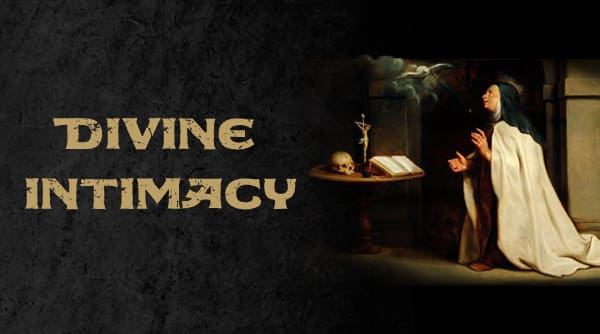Free Sacrifice of Liberty
Presence of God – O Jesus, divine Lamb, immolated voluntarily for the glory of the Father, make me understand the great value of voluntary immolation.
MEDITATION
The vow of obedience has been excellently defined as the “free immolation of liberty” (Pius XII, Allocution to the Congregation for Religious, Dec., 1950). This definition stresses the idea of the freedom of our immolation. It involves no nonchalant passivity, but an intense, noble activity, consisting in the voluntary renunciation of one’s own will by voluntarily submitting oneself to the will of God as expressed in the commands of our superiors. This is very far from the idea of a mechanical, material, or forced obedience, submitted to from necessity–an obedience by which man acts like a machine, or like a servant who submits himself to his master only because he cannot do otherwise. Under these circumstances, there is only the name and the outward appearance of obedience. What is wholly lacking is the inner content: the formal act which consists precisely in the free, and therefore conscious, renunciation of our own wills, in order to adhere to God’s will manifested in the orders of our superiors. Obedience will not be a perfect holocaust unless it contains this double element: free renunciation of self and free adherence to the divine will. This offering will be pleasing and precious in the eyes of God far more than the “oblation of victims” (1 Sm 15:22). If this twofold interior element is lacking, the exterior act of obedience can suffice to keep us from breaking the vow or the promise made, but it loses its profound value and will never succeed in detaching a man from his own will and casting him into God’s will.
When we are satisfied with material, forced obedience, we do not complete the interior act of self-renunciation; though there is the external fulfillment of an order, we are keeping our own will interiorly. Therefore, we cannot say that we have realized the immolation of our liberty, and not even that we have freely embraced the divine will. Such obedience is senseless for a soul that aspires to union with God; it is an attempt to attain the end without making use of the means, to exchange the precious metal of true obedience for a cheap pewter coin. St. Teresa of Jesus tells us that there is “no path which leads more quickly to the highest perfection than that of obedience…. Obedience brings us the sooner to that happy state of union with God” (Foundations, 5). She is evidently speaking only of that obedience which is “the free immolation of liberty,” which has no desire for any other liberty than to do God’s will.
COLLOQUY
O Lord, is there any finer or greater ideal than that of attaining total conformity of my will with Yours, so that it is no longer my own will but Yours that directs, guides, and governs me in all my movements and actions?
Oh! how sublime is this state of perfect conformity to Your divine will! You tell me through St. Teresa: “There is no better way of acquiring this treasure than to dig and toil in order to get it from this mine of obedience. The more we dig, the more we shall find; and the more we submit to men for love of You, and have no other will than that  of our superiors, the more completely we shall become masters of our wills and bring them into conformity with Yours. This is true union with You, my God, the union which I desire; I do not covet those delectable kinds of absorption which it is possible to experience and which are given the name of union. They may be union if the result of them is what I have described; but if such suspension leaves behind it little obedience and much self-will, it seems to me that it will be a union with love of self, not with the will of God. May His Majesty grant that I myself may act according to my belief” (St. Teresa of Jesus, Foundations, 5).
of our superiors, the more completely we shall become masters of our wills and bring them into conformity with Yours. This is true union with You, my God, the union which I desire; I do not covet those delectable kinds of absorption which it is possible to experience and which are given the name of union. They may be union if the result of them is what I have described; but if such suspension leaves behind it little obedience and much self-will, it seems to me that it will be a union with love of self, not with the will of God. May His Majesty grant that I myself may act according to my belief” (St. Teresa of Jesus, Foundations, 5).
O Lord, You know my will’s dislike of submission, of renouncing itself in subjection to the will of another. There is in me a very strong love of liberty and independence, which inclines me to seek a thousand pretexts and means for avoiding the necessity of submitting. But You also know that there is nothing in the world that I love, seek for and desire as much as Your will. In order to live in Your will, to have the certitude and joy of acting in all things according to Your divine will, I am ready with Your help to make every sacrifice to immolate my liberty fully. O Lord, increase my love for Your holy will, enkindle in me a passion for Your will, and then increase in my soul a love for obedience, that golden channel through which the precious treasure of Your will comes to me.
 Note from Dan: These posts are provided courtesy of Baronius Press and contain one of two meditations for the day. If you would like to get the full meditation from one of the best daily meditation works ever compiled, you can learn more here: Divine Intimacy. Please honor those who support us by purchasing and promoting their products.
Note from Dan: These posts are provided courtesy of Baronius Press and contain one of two meditations for the day. If you would like to get the full meditation from one of the best daily meditation works ever compiled, you can learn more here: Divine Intimacy. Please honor those who support us by purchasing and promoting their products.
Art: Teresa of Avila, Peter Paul Rubens, 1615, painting out of copyright, photograph DMonniaux, own work, 2005, CC, Wikimedia Commons. Father Gabriel of St. Mary Magdalen, mirror from open source material.




